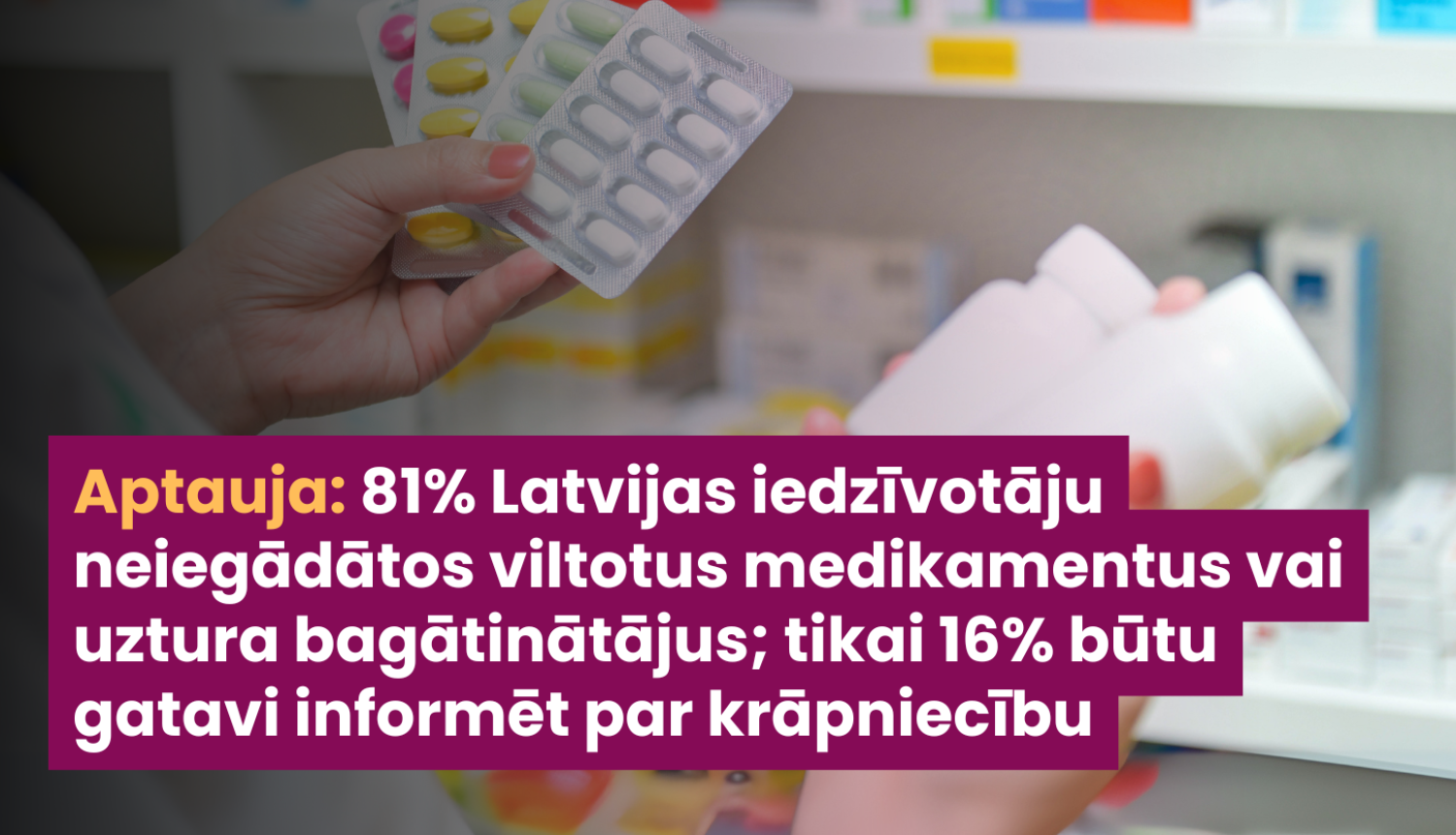According to a survey conducted by the Kantar company commissioned by the Latvian Patent Office as part of the campaign “Choose the original - counterfeiting costs lives!”, 81% of Latvian residents indicate that they would not purchase counterfeit medicines or dietary supplements if they were significantly cheaper than their originals. In turn, only 15.7% would inform the responsible authorities about possible infringement cases, while 67% would refuse to buy counterfeits, but would not report on them.
The survey finds that 81% of Latvian residents would not buy counterfeit medicines or dietary supplements if they were considerably cheaper than their originals. This answer was given more often by women (81.99%) than men (79.74%). Only 4.8% of respondents admit that they would be willing to buy such products, while 14.3% indicate that they have no opinion on the matter.
The survey data also shows that 15.8% of Latvian residents have personally encountered an offer to buy medicines or dietary supplements of unknown origin(counterfeits) in the last year (e.g., from private individuals, on social media, on the Internet ─ from websites that are not licensed pharmacies or not included in the list of the State Agency of Medicines, etc.).
When asked how they would act if they were offered to buy counterfeit medicines or dietary supplements, 15.7% of residents responded that they would inform the relevant authorities about such offers, 67% would refuse to buy counterfeits, but would not report on them. At the same time, 14% admit that they do not know what they would do, and 19% would choose to ignore such offers.
Regional differences
The survey shows slight differences between the regions of Latvia. In Riga, 16% of residents would reject an offer to buy counterfeit medicines and would report on such cases, while in Pierīga this proportion is 15%, in Vidzeme 20.1%, in Kurzeme 13.3%, in Zemgale 18.5%, and in Latgale 10%. At the same time, the total proportion of those who would refuse to buy counterfeits (both reporting and not reporting on them) exceeds 80% in all regions. In Latgale, the number of respondents who admitted that they would ignore the situation and of those who did not know how they would react is comparatively higher.
Similarly, the regional breakdown shows that residents of Riga (19%) have most often encountered offers to buy counterfeit medicines or dietary supplements in the past year, followed by Latgale (18%), Vidzeme (15%), Zemgale (14%), and Kurzeme (12%). In turn, the possibility of buying such products is most often admitted by respondents in Latgale (6%), Kurzeme (5%), and in Riga (5%).
Impact of age and education on attitudes
The most responsible attitude towards counterfeit medicines is shown by residents aged 30 to 49 – in this group, 18.5% would refuse to buy them and would report on such offers. In turn, in the youngest age group (between 18 and 29), 14.2% indicated that they did not know what they would do.
The data clearly shows that the level of education influences respondents’ attitudes towards counterfeit medicines and dietary supplements, as well as their actions in situations where counterfeit medicines or dietary supplements are offered. Among respondents with higher education, 19.9% would refuse to buy counterfeits and would report on the violation, while among those with secondary education, this indicator is only 9.4%.
Director of the Latvian Patent Office Agris Batalauskis emphasizes: “The results of the survey show that the majority of Latvian residents are responsible and not willing to buy counterfeit medicines and dietary supplements. At the same time, however, we must think about that part of society that would reject offers of counterfeit products but would not report on them to the responsible authorities. This means public tolerance for violations, which is particularly dangerous in the field of health protection.
Our goal is to ensure that every resident of Latvia is aware of the risks that counterfeit products, especially counterfeit medicines and dietary supplements, can pose to their health.”
It has already been reported that the Patent Office has launched the campaign “Be original – counterfeiting costs lives!” this summer to draw attention to the protection of intellectual property, especially highlighting health damages posed by counterfeit medicines and dietary supplements.
How to protect oneself and others
Residents are urged to report any suspicious products or sales locations to law enforcement authorities.
- Medications should always be purchased from registered pharmacies only, including buying online from officially licensed platforms, the list of which is published by the State Agency of Medicines.
- Before using medicines, it is important to check the packaging: a seal, expiration date, and manufacturer's name.
- Beware of overly tempting offers on the Internet, especially on social media. Miracle cures "without prescription" or "100% natural" preparations at suspiciously low prices can be dangerous.
- It is always important to consult a doctor or a pharmacist before using any new medication.
- Suspicious products or sales locations should be reported to the State Medicines Agency or a doctor.
The survey commissioned by the Latvian Patent Office was carried out by the Kantar research company from 8 to 10 July 2025. 800 Latvian residents aged 18 to 65 were surveyed on the Internet.



